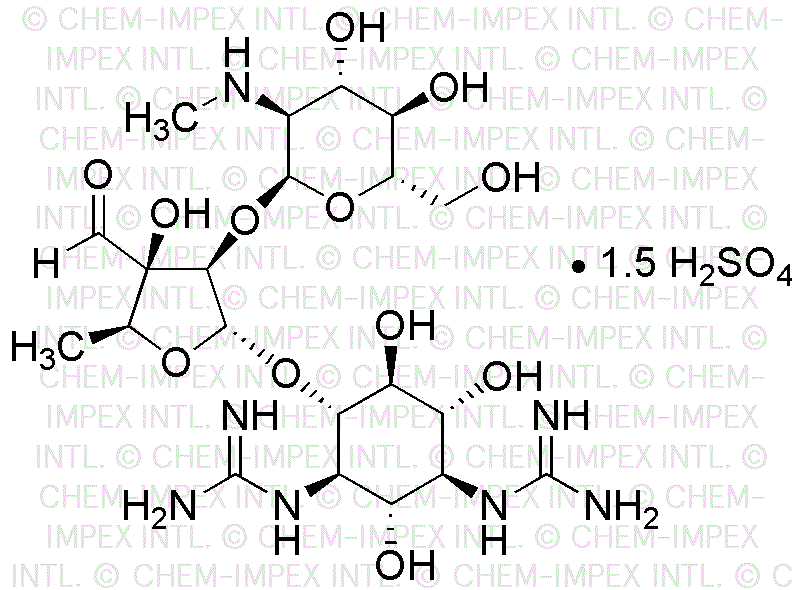Streptomycin sulfate is widely utilized in research focused on:
- Antibiotic Treatment: It is primarily used to treat tuberculosis and other bacterial infections, making it essential in the field of infectious disease management.
- Veterinary Medicine: This compound is often administered to livestock to prevent and treat bacterial infections, ensuring animal health and productivity.
- Laboratory Research: Researchers use streptomycin sulfate in microbiology to study bacterial resistance and the efficacy of antibiotics, aiding in the development of new treatments.
- Cell Culture Applications: It is employed in cell culture media to prevent bacterial contamination, which is crucial for obtaining accurate experimental results.
- Pharmaceutical Development: The compound is involved in the formulation of various drugs, particularly those targeting gram-negative bacterial infections, providing a critical tool for pharmaceutical innovation.
Informations générales
Propriétés
Sécurité et réglementation
Applications
Streptomycin sulfate is widely utilized in research focused on:
- Antibiotic Treatment: It is primarily used to treat tuberculosis and other bacterial infections, making it essential in the field of infectious disease management.
- Veterinary Medicine: This compound is often administered to livestock to prevent and treat bacterial infections, ensuring animal health and productivity.
- Laboratory Research: Researchers use streptomycin sulfate in microbiology to study bacterial resistance and the efficacy of antibiotics, aiding in the development of new treatments.
- Cell Culture Applications: It is employed in cell culture media to prevent bacterial contamination, which is crucial for obtaining accurate experimental results.
- Pharmaceutical Development: The compound is involved in the formulation of various drugs, particularly those targeting gram-negative bacterial infections, providing a critical tool for pharmaceutical innovation.
Documents
Fiches de données de sécurité (FDS)
La FDS fournit des informations de sécurité complètes sur la manipulation, le stockage et l’élimination du produit.
Spécifications du produit (PS)
Le PS fournit une description complète des propriétés du produit, notamment sa composition chimique, son état physique, sa pureté et les exigences de stockage. Il détaille également les plages de qualité acceptables et les applications prévues du produit.
Certificats d'analyse (COA)
Recherchez des certificats d'analyse (COA) en saisissant le numéro de lot du produit. Les numéros de lot et de lot se trouvent sur l'étiquette d'un produit, après les mots « Lot » ou « Lot de fabrication ».
Numéro de catalogue
Numéro de lot/série
Certificats d'origine (COO)
Ce certificat d'exploitation confirme le pays dans lequel le produit a été fabriqué, et détaille également les matériaux et composants utilisés et s'il est issu de sources naturelles, synthétiques ou autres sources spécifiques. Ce certificat peut être requis pour les douanes, le commerce et la conformité réglementaire.
Numéro de catalogue
Numéro de lot/série
Fiches de données de sécurité (FDS)
La FDS fournit des informations de sécurité complètes sur la manipulation, le stockage et l’élimination du produit.
DownloadSpécifications du produit (PS)
Le PS fournit une description complète des propriétés du produit, notamment sa composition chimique, son état physique, sa pureté et les exigences de stockage. Il détaille également les plages de qualité acceptables et les applications prévues du produit.
DownloadCertificats d'analyse (COA)
Recherchez des certificats d'analyse (COA) en saisissant le numéro de lot du produit. Les numéros de lot et de lot se trouvent sur l'étiquette d'un produit, après les mots « Lot » ou « Lot de fabrication ».
Numéro de catalogue
Numéro de lot/série
Certificats d'origine (COO)
Ce certificat d'exploitation confirme le pays dans lequel le produit a été fabriqué, et détaille également les matériaux et composants utilisés et s'il est issu de sources naturelles, synthétiques ou autres sources spécifiques. Ce certificat peut être requis pour les douanes, le commerce et la conformité réglementaire.


